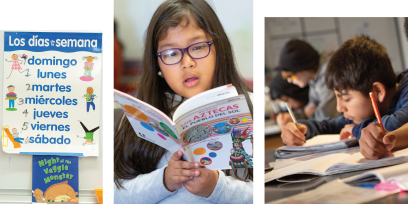Families play an important role in helping schools teach their children to become successful readers and writers. Staying in touch with your child’s teacher is important. You both share the same goal: Your child’s success in school. Ideally, that success will include your child’s being able to speak, read, and write in their home language if it is different than English and in English.
In school, some children are taught to read and write in their home language; others learn only in English. And some are taught in their home language and English. Schools use different approaches to teaching reading, and you might not be familiar with them. But if you ask, your child’s teacher can give you tips for reinforcing what’s being taught at home.
At home, family members have different levels of literacy skills in their home language and in English (which is important for teachers to know so they can customize the tips they share). Some families speak only or predominately English; some only or predominately use their home language(s); others speak a mix of English and another language or languages.
However, despite varied school and family backgrounds and differences among children’s own experiences, there are several things families can do that will help all children. We will discuss many of these things in the articles that follow. The information we share applies to all languages, but we provide examples based on speaking Spanish at home and learning English in school simply because that is by far the most common combination in the United States.
There are three key ideas that apply generally to almost all children and in almost all situations. We hope all families will find them helpful. First, literacy develops over time. It’s not a skill that develops in one particular moment. Second, while learning how to sound out, read, and write words is fundamental for literacy, many other things are also necessary. For example, having a large vocabulary and sufficient knowledge to understand what is heard or read is essential. Also, listening, speaking, and writing for different purposes (such as to inform, entertain, explain, and persuade) are important. Third, speaking two (or more!) languages is an asset. Although all students in the United States should become competent in listening to, speaking, reading, and writing English, every effort should be made to maintain and develop home language and literacy skills. (English-speaking students also should have opportunities to develop skills in a second language.) Bilingualism is an advantage that should be encouraged for everyone.
Claude Goldenberg, an emeritus professor in the Graduate School of Education at Stanford University, is a native of Argentina who taught in a bilingual elementary school early in his career. Linda M. Espinosa is an emerita professor of early childhood education at the University of Missouri–Columbia who has led many studies and published widely on early childhood education and dual language learners. Diane August, a research professor at the University of Houston, leads D. August & Associates, conducting research and consulting on how to improve the education of second language learners. After beginning her career as a teacher, she has been involved in educational research and policy work for more than three decades.
[photos: Allison Shelley for EduImages]

